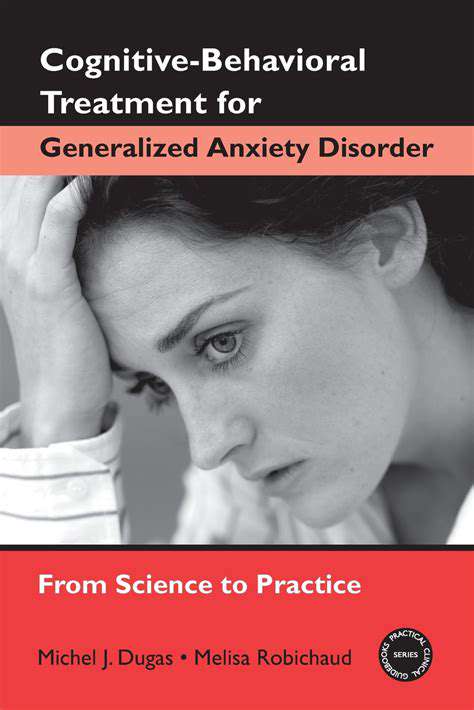Insight into DSM Anxiety Disorders: An Overview

Cognitive Behavioral Therapy (CBT)
When dealing with anxiety disorders, Cognitive Behavioral Therapy stands out as one of the most effective interventions available today. This therapeutic approach helps individuals recognize and modify the negative thought cycles that fuel their anxiety. By working with a trained therapist, patients learn concrete strategies to alter their responses to anxiety-provoking situations.
The true power of CBT lies in its ability to provide individuals with lifelong tools for managing their mental health. Through regular practice, people develop the capacity to identify distorted thinking patterns and replace them with more balanced perspectives. Many find that this approach not only reduces their immediate anxiety symptoms but also builds resilience against future challenges.
Medication Options
For some individuals, pharmaceutical interventions become necessary to manage severe anxiety symptoms. Doctors often prescribe medications like SSRIs (such as fluoxetine or sertraline) or SNRIs (like venlafaxine) to help regulate brain chemistry. These medications typically require several weeks to reach full effectiveness and often work best when combined with therapy.
It's crucial to understand that medication represents just one piece of the treatment puzzle. Finding the right pharmaceutical approach often involves trial and error under medical supervision. Patients should maintain open communication with their prescribing physician about any side effects or concerns that arise during treatment.
Mindfulness and Relaxation Practices
Ancient practices like meditation have found modern applications in anxiety treatment. Simple techniques such as focused breathing or progressive muscle relaxation can significantly lower stress hormone levels. These methods teach individuals to anchor themselves in the present moment rather than becoming overwhelmed by anxious thoughts about the future.
Regular mindfulness practice can literally rewire the brain's stress response systems over time. Many people report that incorporating just 10-15 minutes of daily meditation helps them maintain emotional equilibrium throughout challenging situations. These techniques prove particularly valuable because they're accessible anytime, anywhere - without needing special equipment.
Lifestyle Modifications
The connection between physical health and mental well-being has become increasingly clear in recent research. Regular aerobic exercise, for instance, stimulates the release of endorphins that naturally combat anxiety. Similarly, maintaining stable blood sugar through balanced nutrition helps prevent mood fluctuations that can exacerbate anxious feelings.
Sleep quality deserves special attention when addressing anxiety disorders, as fatigue dramatically lowers emotional resilience. Establishing consistent sleep routines and creating an optimal sleep environment can make a measurable difference in symptom severity. Many treatment plans now incorporate sleep hygiene education as a fundamental component.
Therapeutic Support Systems
Group therapy settings provide unique benefits that individual sessions sometimes can't match. Sharing experiences with others facing similar challenges helps normalize the recovery process and reduces feelings of isolation. These groups often become laboratories for practicing new social skills in a supportive environment.
One-on-one therapy allows for personalized attention to each individual's specific anxiety triggers and coping mechanisms. Skilled therapists can tailor their approach based on a person's unique history, personality, and treatment goals. This customized attention often accelerates progress compared to generalized approaches.
Gradual Exposure Techniques
Exposure therapy represents a specialized form of CBT particularly effective for phobias and PTSD. Therapists carefully design exposure hierarchies to help patients confront feared situations in manageable increments. This systematic approach prevents overwhelming the individual while still promoting meaningful progress.
The beauty of exposure therapy lies in its ability to demonstrate that feared outcomes rarely materialize as catastrophically as imagined. With repeated safe exposures, the brain learns to recalibrate its threat assessment systems. Many patients report feeling empowered as they master situations that previously triggered debilitating anxiety.
The Critical Need for Professional Support

Breaking Down Barriers to Care
Despite growing mental health awareness, many still hesitate to seek professional assistance due to lingering stigma or misconceptions. However, modern therapy bears little resemblance to outdated stereotypes. Today's mental health professionals employ evidence-based techniques in collaborative, non-judgmental settings.
Early intervention often prevents minor concerns from developing into more serious conditions. Just as we consult doctors for physical ailments, mental health professionals provide expert care for emotional challenges. Their specialized training allows them to identify patterns and solutions that might elude even well-meaning friends or family members.
The Growth Potential in Therapy
Therapeutic relationships offer something unique in human experience - a space dedicated entirely to personal exploration without social expectations. This environment fosters profound self-discovery that often leads to unexpected breakthroughs. Many clients find they develop greater self-compassion through the therapeutic process.
Therapy doesn't just address problems - it helps people actualize their full potential. By examining thought patterns and behavioral habits, individuals can make conscious choices about who they want to become. This transformative aspect explains why many continue therapy even after resolving their initial concerns.
Relationship Enhancement
Interpersonal difficulties often stem from unconscious patterns established in early life. Skilled therapists help clients recognize these patterns and develop healthier communication strategies. Couples or family therapy can transform relationships by creating new frameworks for understanding and connection.
Effective therapy teaches people to express needs clearly while remaining open to others' perspectives. These skills ripple out to improve all types of relationships - romantic, familial, professional, and social. Many find that as they change their own behaviors, their entire social ecosystem shifts in response.
Specialized Problem-Solving
Different life challenges require different professional expertise. Career counselors, financial advisors, and legal professionals all bring specialized knowledge to specific life domains. Their guidance can help navigate complex systems that might overwhelm individuals attempting solo solutions.
Professionals save clients time and resources by providing tested frameworks for decision-making. Whether choosing investments or negotiating workplace conflicts, expert advice often leads to better outcomes with less stress. This collaborative approach represents smart resource allocation rather than personal failure.
Holistic Wellbeing
The mind-body connection means that emotional health impacts physical health and vice versa. Integrated treatment approaches address this interplay through techniques like biofeedback or somatic experiencing. Many find that addressing emotional blocks leads to unexpected physical health improvements.
True wellbeing involves aligning values, relationships, work, and self-care into a cohesive life strategy. Professionals help clients examine all these domains to create balanced, fulfilling lifestyles. This comprehensive approach explains why therapy often yields benefits far beyond the original presenting problem.